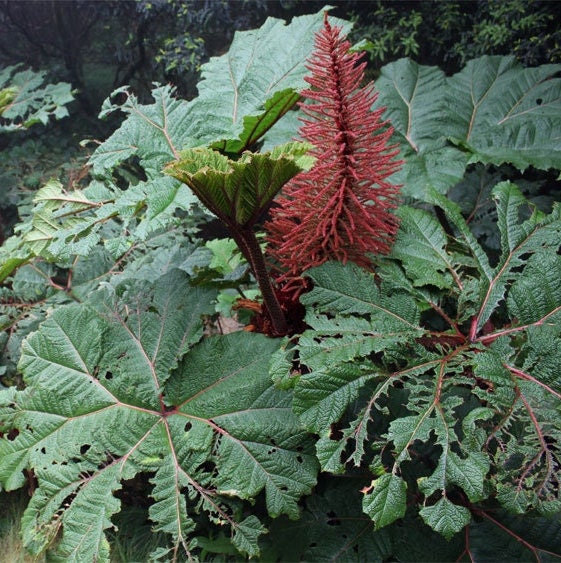Viriar
Gunnera Insignis – Poor Man's Parasol (Seeds) | VIRIAR
Gunnera Insignis – Poor Man's Parasol (Seeds) | VIRIAR
Couldn't load pickup availability
Gunnera insignis
Giant Gunnera
Dramatic South American perennial with prehistoric-looking foliage for bold garden designs
About Gunnera insignis
Gunnera insignis, commonly known as the Giant Gunnera, is a dramatic and impressive perennial plant native to the Andean regions of South America. Known for its enormous, prehistoric-looking leaves and striking appearance, it is often used in large garden landscapes and water gardens to create a bold, tropical effect.
The Giant Gunnera can reach impressive sizes, with leaves that can grow up to 2 meters (6.5 feet) in diameter and stems that can exceed 3 meters (10 feet) in height. The plant features deeply lobed, spiky leaves that have a unique, textured surface and a vibrant green color. The leaves are supported by thick, robust petioles and create a dense, lush canopy.
During the flowering period, the plant produces small, inconspicuous flowers arranged in cylindrical spikes, which are less notable compared to the plant's foliage. The striking visual impact of this plant makes it a standout choice for creating bold and impressive garden designs that command immediate attention.
Growing Conditions
Light Requirements
Gunnera insignis prefers full sun to partial shade. While it can tolerate full sun, it often benefits from some afternoon shade in hotter climates to prevent leaf scorch and maintain vibrant foliage color.
Temperature & Hardiness
This plant thrives in temperate to subtropical climates with temperatures ranging from 10-25 °C (50-77 °F). It can tolerate light frost but is sensitive to severe cold. It is best suited for USDA zones 8-10.
Soil Composition
The Giant Gunnera prefers moist, rich, and well-draining soils. It can thrive in a variety of soil types, including clay, loam, and sandy soils, as long as they are consistently moist. It is particularly well-suited for boggy or waterlogged conditions.
Water Management
Regular and abundant watering is crucial for Gunnera insignis. It requires consistently moist soil, and in particularly hot or dry periods, it may benefit from additional watering or supplementary irrigation to maintain optimal moisture levels. Never allow the soil to dry out completely.
Planting & Care
Site Selection & Planting
Choose a location with full sun or partial shade and ensure the soil is well-draining and rich in organic matter. For planting in containers, use a large pot with excellent drainage and a nutrient-rich potting mix. If planting in the ground, ensure the site has ample space to accommodate the plant's expansive size—this is a truly large plant that demands room to grow.
Fertilization Program
Feed Gunnera insignis with a balanced, slow-release fertilizer or compost during the growing season to support its vigorous growth. Apply fertilizer every 4-6 weeks or as needed to promote healthy foliage and robust development. Rich, nutrient-dense soil is essential for optimal performance.
Maintenance & Protection
Regularly check for pests and diseases, although the Giant Gunnera is generally hardy and resilient. Prune off any dead or damaged leaves to maintain the plant's appearance and encourage new growth. In colder climates, provide mulch or other protection to safeguard the plant during winter months.
Growing from Seeds
Seed Preparation
Soak the seeds of Gunnera insignis in warm water for 24-48 hours before planting to improve germination rates. This pre-treatment softens the seed coat and activates the embryo, significantly enhancing successful germination outcomes.
Sowing Process
Sow the seeds in a well-draining seed-starting mix. Plant the seeds on the surface of the soil and lightly press them in, but do not cover them with soil as they need light to germinate. Light exposure is critical for seed activation and successful sprouting.
Germination Conditions
Place the seed tray in a warm, humid environment with temperatures around 20-25 °C (68-77 °F). Keep the soil consistently moist and provide bright, indirect light. Germination can be slow and may take several weeks to a few months depending on seed age and conditions.
Seedling Care & Transplanting
Once seedlings emerge, provide them with bright, indirect light and gradually acclimate them to more direct light over several weeks. Transplant seedlings into larger pots or directly into the garden when they are large enough to handle and have developed several true leaves.
Quick Reference Guide
Premier Provider of Exceptional Exotic and Rare Seeds Worldwide
Specializing in authentic, carefully curated germplasm selected with meticulous precision and unwavering commitment to quality excellence.
Shipping & Returns
Shipping & Returns
Share











